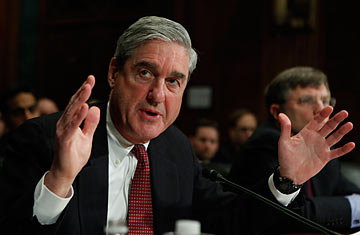
FBI Director Robert Mueller testifies on Capitol Hill in Washington on Wednesday, Jan. 20, 2010, before the Senate Judiciary Committee
The FBI repeatedly broke the law between April 2003 and November 2006 in its efforts to monitor telecommunications in line with counterterrorism objectives, a Justice Department investigation has found. A report released Wednesday, Jan. 20, by the department's inspector general, Glenn Fine, reveals that three major telecom companies — whose identities remain classified — contracted out six of their employees to the FBI and provided the government with unchecked access to phone records without legal authority. Those employees worked in FBI office space with government investigators and responded to more than 700 informal requests for information from the FBI, sometimes relayed verbally or on Post-its. The employees gave agents access to some 3,500 telephone numbers, including call records from reporters and the "calling circles" of individual suspects and others, the report says.
In doing so, the FBI and the telecom employees violated the Electronic Communications Privacy Act multiple times, according to Fine's report, because the FBI agents obtained the call records without properly issuing formal requests for the information, as required by law and Justice Department policy. The "co-location, in combination with poor supervision and ineffective oversight, contributed to the serious abuses" and an "egregious breakdown" in compliance with the law, says Cynthia Schnedar, a spokeswoman for Fine.
The problem started with an effort to get phone records from the telecoms handed off to the FBI in an electronic format that "could be immediately uploaded into FBI databases." The goal was for FBI agents in charge of searching the records to be able to "support FBI counterterrorism investigations in a timely fashion," the report says.
The telecoms' employees were brought into the agents' offices and given desks and computers in an open room filled with FBI agents' cubicles. The telecom workers were given FBI e-mail accounts and telephones and a "separately networked computer that provided access to the records of the communications service provider," the report says. The telecom employees became part of the FBI "team," the report says, participated in daily activities and were available after hours.
Privacy advocates are outraged at the contents of the report. "All the protections built into law for Americans' privacy are at risk when the phone company is collaborating with the government without legal process and providing private information that's protected under law, in violation of the law," says Michael German, a former FBI agent now with the American Civil Liberties Union. Spokespeople for the Justice Department did not return calls for comment.
The report comes at a sensitive time for the Justice Department and the Administration. Both the House and the Senate have passed bills reauthorizing the Patriot Act, which created some of the authority to scan phone records that the report alleges was abused by the FBI. The House version contains some new restrictions; the Senate version gives the FBI freer rein. The Administration has been inclined toward the tougher version of the bill. And as the political environment has become more hostile to Democrats, they are less likely to prioritize civil-liberties concerns over national-security ones.
The inspector general's report says the FBI has tried to fix its problems. It urges disciplinary action but concurs with the conclusion of the Department's Office of Public Integrity that there is insufficient evidence to pursue criminal cases against the FBI agents. The FBI appears chastened, but outside observers and congressional staffers are troubled by one section buried on page 263 of the report. It says, "After reviewing a draft of this report, the FBI also asserted for the first time that ... [it] could have obtained these records without any legal process or qualifying emergency through voluntary production by the communications service providers." Privacy advocates, congressional staffers and the inspector general worry that the FBI is seeking to maintain extraordinary powers to search phone records with no oversight or accountability.
It is not clear who might challenge the FBI's conclusion within the Executive Branch now that the inspector general's office has issued its report and Congress has shown little appetite to pursue the matter. Court cases would be challenging because the classified status of the records makes it difficult for anyone to sue the government. Says Marc Rotenberg of the Electronic Privacy Information Center: "The objection we've always had about these programs is that they lack independent judicial review. Without that, you have the police policing themselves."
